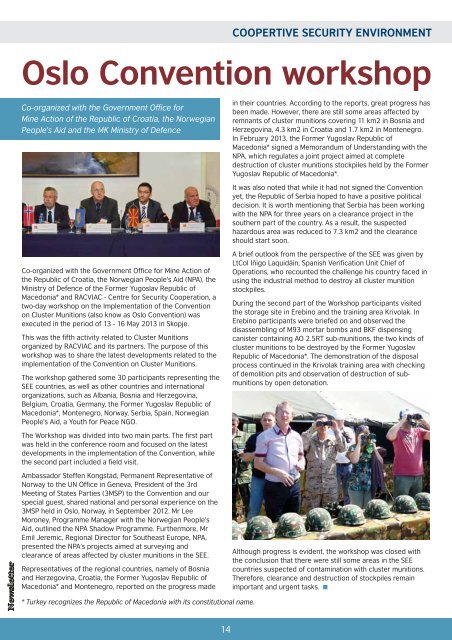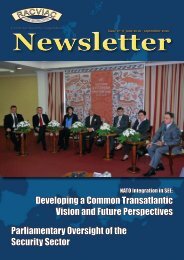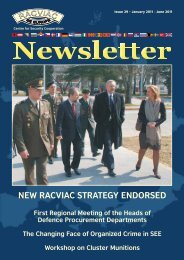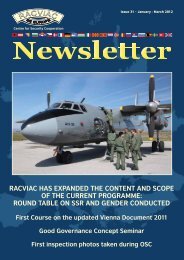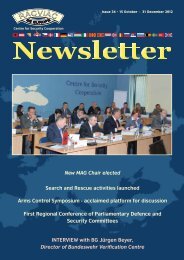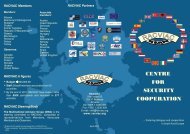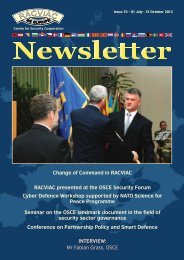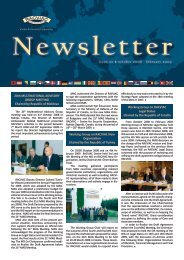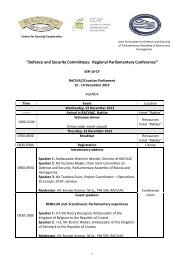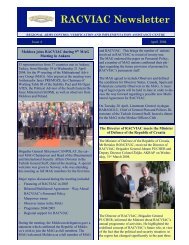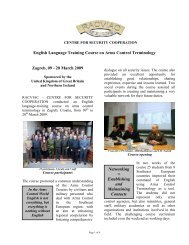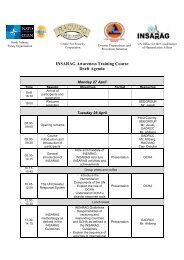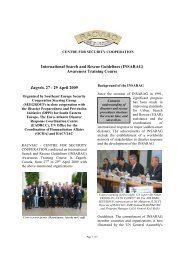Newsletter #36 - RACVIAC
Newsletter #36 - RACVIAC
Newsletter #36 - RACVIAC
You also want an ePaper? Increase the reach of your titles
YUMPU automatically turns print PDFs into web optimized ePapers that Google loves.
COOPERTIVE SECURITY ENVIRONMENT<br />
Oslo Convention workshop<br />
Co-organized with the Government Office for<br />
Mine Action of the Republic of Croatia, the Norwegian<br />
People's Aid and the MK Ministry of Defence<br />
in their countries. According to the reports, great progress has<br />
been made. However, there are still some areas affected by<br />
remnants of cluster munitions covering 11 km2 in Bosnia and<br />
Herzegovina, 4.3 km2 in Croatia and 1.7 km2 in Montenegro.<br />
In February 2013, the Former Yugoslav Republic of<br />
Macedonia* signed a Memorandum of Understanding with the<br />
NPA, which regulates a joint project aimed at complete<br />
destruction of cluster munitions stockpiles held by the Former<br />
Yugoslav Republic of Macedonia*.<br />
It was also noted that while it had not signed the Convention<br />
yet, the Republic of Serbia hoped to have a positive political<br />
decision. It is worth mentioning that Serbia has been working<br />
with the NPA for three years on a clearance project in the<br />
southern part of the country. As a result, the suspected<br />
hazardous area was reduced to 7.3 km2 and the clearance<br />
should start soon.<br />
Co-organized with the Government Office for Mine Action of<br />
the Republic of Croatia, the Norwegian People's Aid (NPA), the<br />
Ministry of Defence of the Former Yugoslav Republic of<br />
Macedonia* and <strong>RACVIAC</strong> - Centre for Security Cooperation, a<br />
two-day workshop on the Implementation of the Convention<br />
on Cluster Munitions (also know as Oslo Convention) was<br />
executed in the period of 13 - 16 May 2013 in Skopje.<br />
This was the fifth activity related to Cluster Munitions<br />
organized by <strong>RACVIAC</strong> and its partners. The purpose of this<br />
workshop was to share the latest developments related to the<br />
implementation of the Convention on Cluster Munitions.<br />
The workshop gathered some 30 participants representing the<br />
SEE countries, as well as other countries and international<br />
organizations, such as Albania, Bosnia and Herzegovina,<br />
Belgium, Croatia, Germany, the Former Yugoslav Republic of<br />
Macedonia*, Montenegro, Norway, Serbia, Spain, Norwegian<br />
People's Aid, a Youth for Peace NGO.<br />
A brief outlook from the perspective of the SEE was given by<br />
LtCol Iñigo Laquidáin, Spanish Verification Unit Chief of<br />
Operations, who recounted the challenge his country faced in<br />
using the industrial method to destroy all cluster munition<br />
stockpiles.<br />
During the second part of the Workshop participants visited<br />
the storage site in Erebino and the training area Krivolak. In<br />
Erebino participants were briefed on and observed the<br />
disassembling of M93 mortar bombs and BKF dispensing<br />
canister containing AO 2.5RT sub-munitions, the two kinds of<br />
cluster munitions to be destroyed by the Former Yugoslav<br />
Republic of Macedonia*. The demonstration of the disposal<br />
process continued in the Krivolak training area with checking<br />
of demolition pits and observation of destruction of submunitions<br />
by open detonation.<br />
The Workshop was divided into two main parts. The first part<br />
was held in the conference room and focused on the latest<br />
developments in the implementation of the Convention, while<br />
the second part included a field visit.<br />
Ambassador Steffen Kongstad, Permanent Representative of<br />
Norway to the UN Office in Geneva, President of the 3rd<br />
Meeting of States Parties (3MSP) to the Convention and our<br />
special guest, shared national and personal experience on the<br />
3MSP held in Oslo, Norway, in September 2012. Mr Lee<br />
Moroney, Programme Manager with the Norwegian People's<br />
Aid, outlined the NPA Shadow Programme. Furthermore, Mr<br />
Emil Jeremic, Regional Director for Southeast Europe, NPA,<br />
presented the NPA's projects aimed at surveying and<br />
clearance of areas affected by cluster munitions in the SEE.<br />
Representatives of the regional countries, namely of Bosnia<br />
and Herzegovina, Croatia, the Former Yugoslav Republic of<br />
Macedonia* and Montenegro, reported on the progress made<br />
Although progress is evident, the workshop was closed with<br />
the conclusion that there were still some areas in the SEE<br />
countries suspected of contamination with cluster munitions.<br />
Therefore, clearance and destruction of stockpiles remain<br />
important and urgent tasks.<br />
* Turkey recognizes the Republic of Macedonia with its constitutional name.<br />
14


